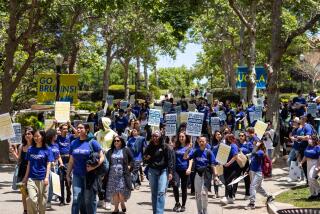China’s Reformers Made the Beat Go On
- Share via
Tiananmen 1989 was a struggle for the hearts and minds of the people, a struggle that continues. Wang Dan, now in exile in the U.S., has earned much respect for his willingness to reexamine his own involvement as a student leader in 1989. In April of this year he came up with the formula that “the students were wrong, but the government was criminal.”
This incurred the wrath of another important democracy activist, Ren Wanding, who sees the student movement as a revolutionary event that needs no apology.
At its core, the Wang-Ren argument is the perennial struggle between reformists and rebels, between proponents of incremental, graduated change versus those who take quantum leaps to overturn the establishment.
Veteran democracy advocate Ren, who was serving his first prison sentence for the 1979 Democracy Wall Movement when Wang was just a kid in primary school, has taken exception to the younger man’s recent tar-brushing of the students and most especially their hunger strike, which was, in Ren’s opinion, a great accomplishment--the critical moment when the students forged a bond with the common people.
Ren, like Wang, was imprisoned for his role in the 1989 protests. But Ren argues that Wang is a captive of the Chinese Communist Party’s reform wing, the so-called Hu Yaobang-Zhao Ziyang clique, which is badly out of touch with the people and still trying, in vain, to reform communism from within. Ren further claims that the true democratic movement is under attack from this clique.
That two highly respected dissidents can see things so differently is a reminder of the complexity of Chinese politics. Although Ren’s broadside has a cantankerous tone and his argumentation is weak in places, he nonetheless raises several important questions.
He is almost certainly correct about the historic importance of the 1989 rebel-led hunger strike; the image of students fasting in the hundreds ignited popular participation in a way that even Wang Dan was unprepared for.
Ren believes that even had the protests succeeded, the Communist Party’s grip on China would have continued unabated, with Zhao Ziyang the victor of single-party rule. He thus resents the way “the people’s democratic movement” was co-opted by Zhaoist reformers whose primary goal was to punish the conservative wing of the party.
He reminds us that the millions of people who at one time or another marched at Tiananmen did so not to replace one Communist bureaucrat with another, but to restore “power to the people” and make China a better country. Reforming communism cannot lead to democracy, he says, because it’s an impediment to democracy.
Ren, who describes prison “as the place where he lost all his fear,” said that when he was released in 1996, he was shocked to hear all the revisionist talk about blaming the students.
However, when Wang got out of prison about the same time, he told a reporter that “he wouldn’t have led the movement if he’d known there’d be casualties.” Wang has shown plenty of courage in his own quiet way. He was one of the few people on the square for whom democracy was more than a buzz word. He stoically endured political setbacks and two prison terms and yet appears to be a man of little rancor. He persuasively argues against his rival’s view that the end justifies the means.
It seems reasonable now to describe the “ballad of Tiananmen” this way: The rebels were like the lead singer and hot guitarist in a band; during a live concert it is they who get most of the attention. But it was the reformers, the drummer and bassist if you will, who penned most of the lyrics and kept things in the groove. Their contributions are more obvious when you listen to the tape later on.
Tiananmen 1989 was a tragedy for everyone, but the Politburo certainly deserves special criticism for letting their power struggle consume the young. Li Peng and Zhao Ziyang, cut from the same communist cloth, were not butchers, but their mutual intransigence dashed hopes for an amicable settlement, so they were the “botchers” of Tiananmen.
That it all came to a heartbreaking end was not the fault of individuals as much it was the fault of a fossilized, archaic system ill-suited to accommodate the bold and astonishing patriotism of Wang Dan, Ren Wanding and millions of others.
More to Read
Sign up for Essential California
The most important California stories and recommendations in your inbox every morning.
You may occasionally receive promotional content from the Los Angeles Times.













